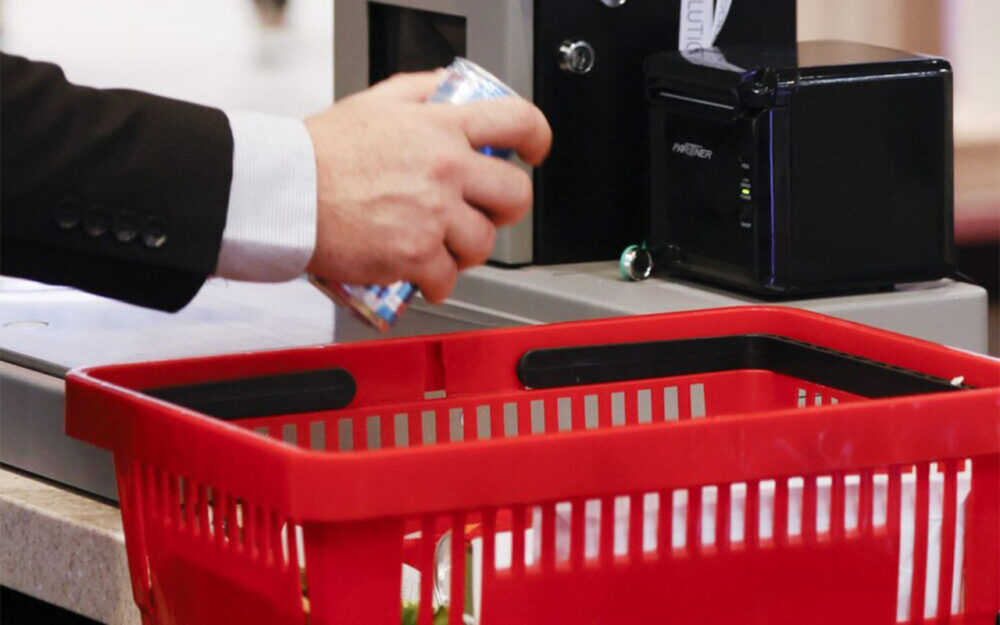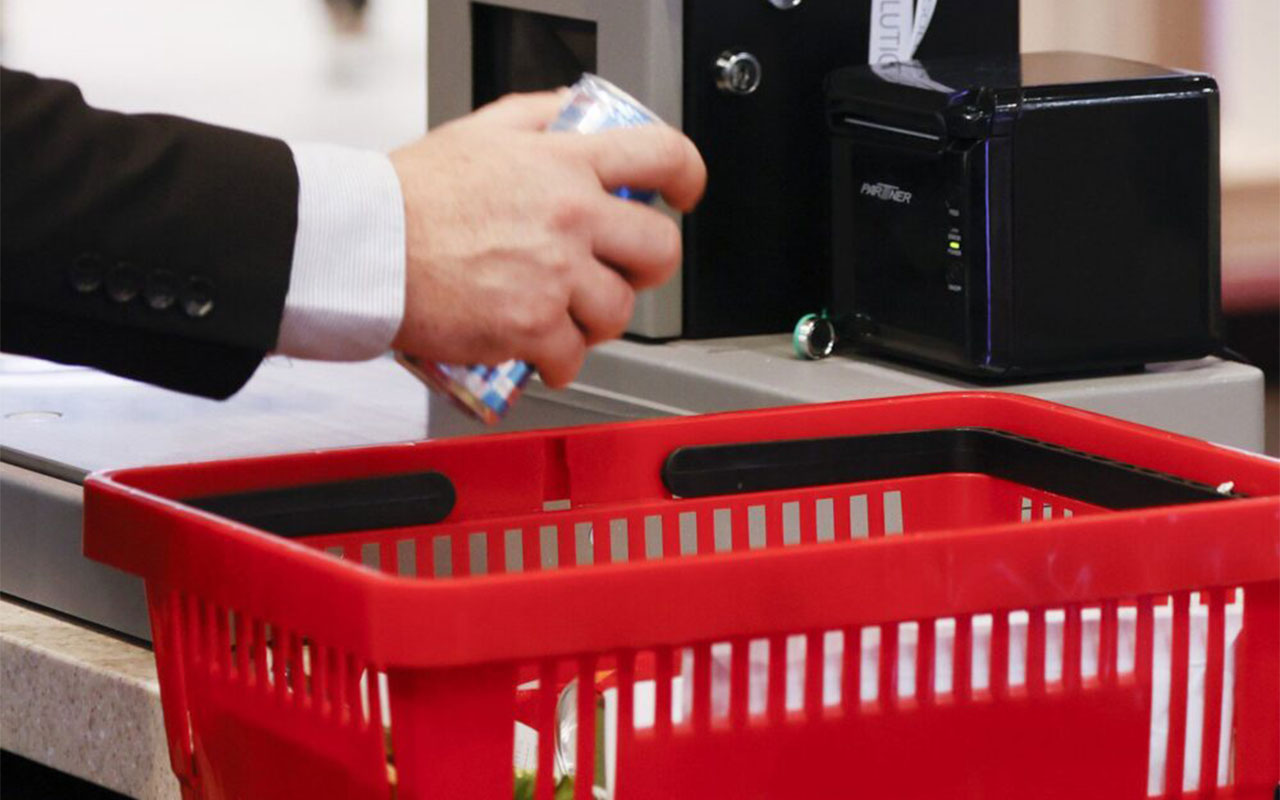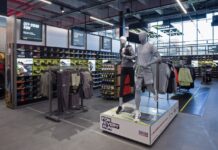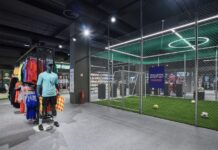Inferring meaningful information from digital images and videos: retailers’ hopes to have a new, highly efficient tool against shoplifting, loss and organised crime in future are based on Computer Vision, a sub-segment of Artificial Intelligence (AI). At EuroCIS 2024 in Düsseldorf exhibitors will demonstrate how far this technology has already come.
The camera points at the scan area of the self-checkout terminal. The recorded video sequences are matched with pre-defined loss scenarios in the background. Was an item passed by the scanner without scanning it or was probably another article scanned instead? Was an EAN code covered by a finger, or two articles held in front of each other? Does the article match the EAN code? Has a shopper moved away from the self-checkout without a payment transaction? Be it intentional or negligent: the security system comprising IP cameras and AI-based software learns and detects such operating errors and/or wrong behaviours and issues a warning in real time.

The corresponding responses can be defined by the user for each individual case: a note to the customer on the terminal display saying that one article was not properly captured – alternatively (or in combination with) an audio message; or a message sent to the responsible employee, via a mobile device, for example, allowing the recorded transaction to be reviewed. Another option is the automatic abortion of the check-out process in case of specific actions or direct monitoring of the shopper by store staff. “Thanks to such AI-assisted real-time analyses retailers can take data and facts-based decisions and avoid potential inventory discrepancies at self-checkouts,” says Nino Hörttrich, Head of Global Marketing Retail at Diebold Nixdorf.
Artificial Intelligence: the new building block for the “Wall of Secure”
On the one hand, this system targets occasional shoplifters who are just seeking a few “price savings”; on the other hand, it also addresses professionals who are after high-priced products and prefer self-checkouts because they are familiar with the customary technical loss-prevention measures and come up with creative ways to circumvent them. Correspondingly high is the interest retailers take in the new AI-based software solutions that are gradually “fed” with (visual) information on new shoplifting and fraud scenarios and on shoplifters’ approaches and typical behaviours. Systems learn and are getting better and increasingly reliable at detecting, assigning, comparing and smartly interpreting incidences to then make recommendations for action on this basis.
Loss Prevention platforms with a host of applications
In order to make such additional security tools available for their retail customers the providers of self-checkout solutions act as drivers of computer-vision technology. Diebold Nixdorf, for instance, has developed jointly with its UK partner SeeChange, a corresponding solution under the label “Vynamic Smart Vision”, which is already been trialled in live operation. ITAB cooperates with specialists Signatrix and Rapitag in the camera-based AI segment and is currently running lab tests with some retailers. Toshiba is currently also rolling out its solutions for Produce Recognition and Fraud Prevention for two projects. Matching tools for self-checkout are not only provided by checkout system vendors but also by security service specialists such as Axis Communications, Sensormatic or Re-Vision (now part of Extenda Retail). At EuroCIS, GK Software will also exhibit an AI-based solution: GK AIR Fraud Detection was developed with the aim of integrating a machine-learning shopping cart check at the Point of Sale. This software establishes the probability of a correct scan process for each shopping cart using a scoring algorithm. Based on the current shopping cart data and the shopper’s behaviour it detects irregularities in a transaction. The AI constantly learns and uses this knowledge for future decisions.
Analyses at the checkout and across the entire retail area
At EuroCIS 2024 retail trade visitors can find detailed information about the applications at the stands of all aforementioned IT service providers – applications that are usually supported by platforms in combination with other security tools. At Diebold Nixdorf, for example, these solutions form part of the holistic Vynamic AI platform. Toshiba calls its platform “ELERA Security Suite” and works – unlike other providers – with Edge cameras where the business logics are supported by the camera and no server is needed. Practical tests and initial regular installations of computer-vision technology currently still focus on self-checkout scenarios. But work is also underway to leverage stores’ entire video infrastructure to generate data and application cases. This principle forms the basis for Sensormatic Solutions, to name but one, – also to provide more protection against organised crime. Here, camera and software serve to already identify masked persons or those behaving aggressively or suspiciously or carrying dangerous objects in the store or in the parking lot. On this basis, the AI-based programme develops recommendations for cases in which retailers should take countermeasures at an early stage. “The centrepiece of the solution are the proprietary AI algorithms of Sensormatic, but we are supported by a whole cluster of technology partners and also integrate third-party data sources,” explains Dominik Brosch, Market Development Manager at Sensormatic Solutions.
AI will enable many new applications for more security in future
Outstanding expertise in video surveillance and analysis also comes care of Axis Communications. The company also operates an open platform making available both their own and AI-driven retail security solutions developed by or jointly with technology partners – related to checkout as well as the entire retail area. The AXIS developers work on incorporating various fraud scenarios beyond the checkout in AI applications, to name but one approach. Examples: a shopper picks up an expensive whiskey, but it is not included in the shopping cart at the checkout. Or a shopper leaves a stash of goods outside the store that are collected at night. For this and many other types of fraud the AI software is trained and fed with data until it arrives at reliable assessments.
In future, so-called re-identification will also be possible. A shopper with a criminal record who was caught in store A and registered there with specific characteristics (clothing details, behaviour, physical characteristics – subject to compliance with data protection), will also be identified in store B and trigger respective precautions. “AI-assisted image analysis will open up many possibilities in future,” says Ralph Siegfried, Key Account Manager End Customers and retail expert at Axis Communications. These possibilities are also the daily business for Re-Vision (a Business Unit of Extenda Retail). This IT service provider also offers a loss-prevention platform with applications for improved checkout security – by way of an AI-assisted tool for risk analysis of the shopping cart and shopping behaviour. To this end, a specific fraud probability is established for each shopper based on current and previously collected data (such as specific behaviours on the retail area, the number of re-scans within certain periods). Based on this (dynamic) level the system decides on whether this shopper is asked to do a re-scan for the current shopping transaction. “Avoid false alarms, check selectively, check less but find more – these are the benefits of our platform,” says Jens Völling, RV Customer Success at Extenda Retail.
The upcoming EuroCIS offers the opportunity to discover the latest trends in hardware and software specifically tailored to the retail sector. EuroCIS, The Leading Trade Fair for Retail Technology, will take place in Düsseldorf from 27 to 29 February 2024. Under the motto “Go beyond today”, numerous companies will once again present solutions and products with which retailers can shape and secure their future. In addition, the trade fair is an excellent networking platform for the specialist community and offers an extensive supporting programme that provides plenty of inspiration and updates on the topic of retail technology.
Tickets are available online. Further information can be found at: www.eurocis-tradefair.com














